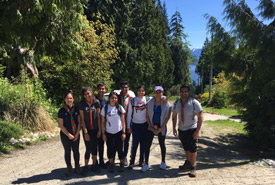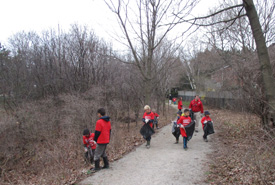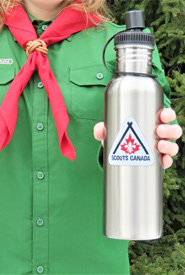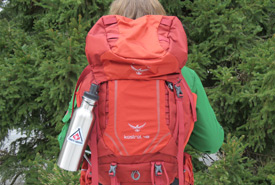Heard it from a Scout: Plastic-free camping

A group of Scouts on a camping trip (Photo courtesy of Alyana Lalani)
For Scouts, the natural world is incredibly important. The environment is our home, a place where we play, learn and have fun, so it is our duty to take care of it. The Leave No Trace principle, which provides guidelines on how to minimize your impact on the environment when out in nature, is extremely important to follow.

Scouts picking up litter (Photo by Scouts Canada)
As sustainability trailblazers, Scouts use our innovation and imagination to reduce plastic use, leading actions for change in our communities. If you’re not sure how to be more eco-friendly while adventuring outdoors, check out these four Scout tips to avoid using plastic while hiking and camping.
1. Ditch single-use plastic water bottles

Stainless steel water bottles are environmentally friendly alternatives to single-use water bottles (Photo by Scouts Canada)
According to Earth Day Network, “one million plastic bottles are bought every minute around the world,” and National Geographic has stated that “less than one-fifth of all plastic is recycled globally.” While you might think that recycling plastic products is sufficient, it is more effective to simply not use them in the first place.
According to the Ocean Conservancy, around eight million tons of plastic end up in our oceans each year. National Geographic points out that many animals, such as seabirds, mistakenly ingest these plastics — sea turtles may even eat plastic bags, thinking they are jellyfish.
Additionally, when plastic starts to break down, harmful chemicals are released into the water. Tiny pieces of plastic (called micro-plastics) and their toxins are also passed on from one organism to another when eaten. That means that the fish you might be eating for dinner could have ingested micro-plastics, which could then be passed on to you.
Ditch your single-use plastic water bottles and other plastic products and use cost-effective alternatives instead, like stainless steel water bottles, which are BPA-free and most importantly, reusable.
2. Avoid single-use utensils
A really convenient tool that I use whenever I go camping is a metal three-in-one multi-tool set that consists of a fork, spoon and knife. The utensils fold up like a pocket knife, making it easy to put inside a mess kit or pocket. The utensils can be separated from the tool itself, in case you need both the fork and spoon at the same time. It is a great alternative to plastic cutlery, and as it is metal, it is long-lasting as well.
3. Zero-waste products

Bringing soap and shampoo bars instead of liquid soaps helps reduce the weight of your gear when camping (Photo by Scouts Canada)
Packaging makes up almost one-third of the waste in landfills. To help reduce your waste, and as a bonus, the weight of your gear when camping, invest in soap and shampoo bars that come in reusable metal tins. Not only will you eliminate waste, but the bar is also much smaller and lighter for packing, and there’s no risk of spilling. Many are made from natural and organic ingredients.
4. Buy in bulk
Sometimes it’s difficult to completely get rid of plastic products in your life, but a trick my Scouts group uses to minimize plastic waste when camping is buying food in bulk. Many classic camping snacks — like granola bars and trail mix — come in individually wrapped packages. Instead of buying them this way, we buy them in bulk and then evenly distribute them into reusable food containers, reducing the amount of waste produced when camping.
The Venturer Scouts’ motto is “challenge,” so I challenge you to take an extra step to reduce your environmental footprint and impact on the planet. If we want to continue enjoying Canada’s mountains, lakes, forests and oceans for years to come, it is up to us to help protect them.
"Heard it from a Scout" is written by members of Scouts Canada’s Youth Spokesperson program. This post was authored by Alyana Lalani.


